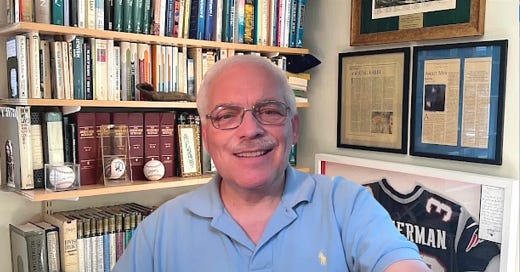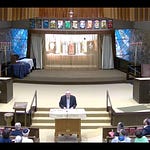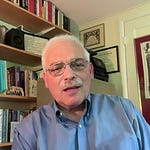I spoke these words last year on MLK Weekend. Like this year, Moses was being introduced in the Torah that same Shabbat.
Both prophets were often unheeded, by allies and opponents alike. I explore why. The Israelites were “short-spirited,” according to Exodus, and Americans of Dr. King’s time - and ours - are too. The frantic pace of modern life exhausts our souls. Yet, as I say at the end, King’s message finally did get across and it did so resoundingly - and it continues to reverberate, a full generation after his death.
The message of this sermon has resonance after the 2024 election. Sometimes a visionary, hopeful message isn’t getting across because the people are exhausted, as with the ancient Israelites, who still had the mentality of slaves in Egypt. But they still need to hear the prophetic voice, and glimpse the world of possibility, from one who stood on the mountaintop and looked into the Promised Land. Eventually, the vision will take hold.
An adapted version of the sermon transcript is below.
And, totally unrelated to today’s topic, I’m thrilled to announce that I passed 4,000 subscribers today - plus an additional 4,500 followers. So, 8,500 engaged readers. For those who have come aboard over the past couple of months, welcome! Here’s a post that I shared on December 1, 2,000 new subscribers ago, reintroducing myself and describing my transition from a pulpit rabbi to a Substack rabbi at breakneck speed, and what I've learned from it. I do not take lightly the trust you have placed in me, and I’m so excited about the diversity and warmth of this subscriber base. I’m also thrilled to be hearing from some old friends from my prior positions and maintaining ties with them. Please leave comments and send me your ideas and impressions. A special thank you to those who have become paid subscribers to support my work. And by all means, please continue to share my articles and encourage others to sign up for this newsletter.
I was rummaging through some articles and came across an article about Dr. King from Time Magazine, written in 2020.
Here's a little excerpt of it. “Dr. King in his last years was more radical than everyone around him.” 1
And it goes on to list the evidence:
He dragged the Southern Christian Leadership Conference to campaign in Chicago and his lieutenants didn't want to go.
He was pelted with rocks there and admonished his staff that white Americans had never intended to integrate their schools and neighborhoods.
He then pointed out that white Americans literally, quote, sought to annihilate the Indian.
He defied the civil rights establishment, the Johnson administration, and other leadership, including his closest advisors, by opposing the Vietnam War
He campaigned for a minimum guaranteed income and bitterly regretted that he could not speak in public about democratic socialism.
And so we don't remember that he was, at that time, perhaps the most hated person in America as well as the most admired. Now I'm not saying this just to shock. There's a purpose behind it. It's important for us to remember that he understood what he was up against.
Now, there's no question he had an incredible ability to speak. He was an incredible orator. He was a prodigy, in fact, from his youngest years. And he never achieved old age, so we don't know what kind of wisdom he would have shared in his older years had he had them. But while he was alive, he was hated.
You have to make sure that people are not exhausted, that they are able to pay their monthly bills, and then maybe they can hear the loftier message. But you can't quit the lofty oratory either. You have to believe that such heights are possible.
Now I don't mean to impugn MLK or question his wisdom in taking up so many causes that people then considered radical. He was a man of great integrity who seemed to know that he didn't have all the time in the world to get his message across.
He understood that he wouldn't get to the promised land. But did he understand that his message would essentially not be heeded in his lifetime? And that you can be the best orator of all time and the people still won't be moved?
Did he understand how fruitless some of these causes would be? I mean, they did hear him in 1963 at the steps of the Lincoln Memorial, but by 1967, that's four long years. And with his own community being crushed under the plagues of poverty and strife, could he understand that he was not being heard? Moses understood.
Moses wasn't a prodigy like King. He never was a great speaker. He begged God to give someone else the job of leading this charge to freedom. He went back to Egypt and spoke to Pharaoh and the people in chapter 6 of Exodus that we read this weekend.
And the people, it says in the chapter in Exodus, the people didn't listen to him. And there were two reasons given why the people didn't listen to him, and they're instructive as we think about Dr. King and Moses and their legacies.
The first: So it says when Moses told the Israelites that he was planning to ask Pharaoh to let them go, they wouldn't listen to Moses because their spirits were crushed by cruel bondage.
And then a couple of verses later, the other reason given why the people didn't listen to Moses was one that actually Moses had been complaining about already. That, he said, “the Israelites won't listen to me. How should Pharaoh then listen to me? I am aral sfatayim. I am tongue-tied.”
Or literally, “I have uncircumcised lips.”
I'm sure every mohel in the congregation right now just had their heart skip a beat. Say what? They're circumcising lips now?
So those are the two key expressions why Moses wasn't heard.
Mikotzer ruach, miyavadah kasha is the narrator's reason.
And Moses' own claim that he is aral sfatayim, his sealed lips, his uncircumcised lips.
Let's get into this a little deeper. Why was Moses unheeded? Here are some of the commentary threads. One, he was lacking in confidence. He was not assured. Maimonides says Moses blamed himself.
His lack of confidence already was addressed by God, but Moses thought Aaron would address the people on behalf of God, and the elders would address Pharaoh. Moses would just stand in the background. But now God said, “No, no, you're going to speak.” And all of his securities rose to the surface.
Sometimes great leaders are not great public speakers, but they still do okay. Sforno says, Moses saw that his first trip, his first foray into Pharaoh's court, had only made matters worse, so he lost confidence, and that spread to the people.
With no positive results, after all, what have you done for me lately, Moses? Why go on? And with lips “uncircumcised,” he wasn't yet battle hardened. That's what the rabbis say. Like an infant, in English ironically we call it a baptism under fire. He hadn't had that baptism under fire.
Or perhaps uncircumcised lips means that he was not yet a true believer. He didn't quite fit in. He didn't feel like a member of the tribe. He grew up in Pharaoh's court, after all. He wasn't an insider among the Israelites. He couldn't feel their pain.
And I have no idea how the commentators would know that circumcision allows for greater feeling, but we won't go there.
So that's all under the category of Moses lacking confidence.
Here's another idea. Why did Moses just not make it? Why Did He Stammer? Why Did He Stutter? That's a question the commentators ask.
Not because God gave him a gift of speech that was imperfect, but because the people impeded his speech. This is an interesting one. Sfat Emet2 goes in this direction, sort of like a tree falling in the forest. If there are no listeners, there can be no speech.
You need an audience to bring out the power of the message. The people have to help him to do that, to empower him. That's why it matters that people come to services. We can only be as good as the number of people who hear us. If you're speaking to an empty room, you won't be heard.
And Moses was speaking to people who weren't ready to hear him. Therefore, that's why he was of uncircumcised lips. Now the leader has to be in sync with the people. That's another cause for Moses not to be heard and perhaps for Martin Luther King as well. The people weren’t ready for their message.
Rabbi Yitz Greenberg, one of my teachers, said that a leader can be no more than 15% ahead of the people. I remember hearing this from him and asking, how can you judge? You're looking out at a congregation. How can you judge if you're 15% ahead of them or more? And he said, you'll know.
And I guess I found out. It's a great lesson for all preachers, including Martin Luther King. It doesn't mean you can't challenge people to be better. You have to, but you have to know where they are and where they're capable of going. And in some ways, MLK never really did. He was thinking of that view from the mountaintop.
Moses would never make it to the Promised Land either, but he understood, and that's what scared him so much. He understood that he was so far ahead of them. They weren't ready for freedom. People didn't listen to him. Mikotzer Ruach, and the traditional interpretation of that expression is that they were tired.
Their physical needs needed to be met before they could contemplate being redeemed. They were too beaten down to dream. And this doesn't just happen to the downtrodden, but to all of us. It happened to the Israelites in Egypt, but it also happened to communities in Harlem and Watts and Detroit and Philadelphia in 1967, 1968. And lots of people in 2024.
It doesn't mean you can't challenge the people to be better. You have to, but you have to know where they are and where they're capable of going.
Even in the best of circumstances, we're out of breath, we're overworked. Every new convenience just makes us feel busier. Kotzer ruach means short-spirited. Drained of spirit, the frantic pace of modern life, poverty, hunger exhausts our souls. Everything in our day as well. And not just for one or two communities, but for all of us.
We're tired, we’ve got health issues. We’re fearful too. 3. And we’re drained of hope.4
It's very hard to hear the preacher. Now here's what Moses did. And this is fascinating.
It's not in the Torah, but there's Midrash that instead of trying to find a way to just get Pharaoh to let them go right away, he tried to go for an incremental negotiation, you know, sort of like a hostage release process.
So, he tried to get them to agree to give the people a day off, to give them Shabbat. Shabbat hadn't been introduced yet. So he sort of said, what about this seventh day? Maybe just let them not be slaves one day.
And he hoped that maybe if Pharaoh would agree to this deal, the people would be less exhausted and more ready to hear his message. You know, you have to, and you can ask the President of the United States, you have to take care of the bread-and-butter issues. You have to make sure that people are not exhausted, that they are able to pay their monthly bills, and then maybe they can hear the loftier message. But you can't quit the lofty oratory either. You have to believe that such heights are possible, and that was Martin Luther King's greatest strength, which Moses was never capable of.
And we have to understand when the time is to deliver that message and to keep delivering it. And understand that at first people won't listen to you.
Bill Clinton was known as a pretty good speaker. But when he first came on the scene, when people heard him for the first time at the 1988 Democratic Convention, his biggest applause line was, “In conclusion….” Sometimes people need to just be ready to hear you.
The same happened with a modern-day Moses, King George VI, whose famous stutter was immortalized in the film, “The King’s Speech.” But when his date with destiny arrived on Sept. 3, 1939, he was there to embrace it. And the people were there to embrace his every word.5
For Martin Luther King, his time came as well. During his life, to a degree, but by far his greatest influence has been felt posthumously.
And his words, and his vision, have become immortal.
Gary Dorrien, author of Breaking White Supremacy: Martin Luther King Jr. and the Black Social Gospel, said something rather shocking.
"Dr. King, in his last years, was more radical than everyone around him. He dragged the Southern Christian Leadership Conference (SCLC) to campaign in Chicago, where his lieutenants did not want to go. He got pelted with rocks in Chicago and admonished his staff that white Americans had never intended to integrate their schools and neighborhoods. He added pointedly that white Americans “literally sought to annihilate the Indian.” He defied the Civil Rights establishment, the Johnson Administration, and his closest advisors by opposing the Vietnam War. He campaigned for a minimum guaranteed income and bitterly regretted that he could not speak in public about democratic socialism. At the end he dragged SCLC into the Poor People’s Campaign, now outflanking even James Bevel, his usual barometer of going too far.
After he was gone the memory of King taking the struggle to Chicago, railing against the Vietnam War and economic injustice, emphasizing what was true in the Black Power movement, and organizing a Poor People’s Campaign faded into an unthreatening idealism. King became safe and ethereal, registering as a noble moralist. It became hard to remember why, or even that, King was the most hated person in America during his lifetime. But the King that we need to remember is the one who keenly understood what he was up against."
Rabbi Erin Leib Smokler (from Sfat Emet on the Parsha; IJS Torah commentary)
On the verse, “[But Moses appealed to the LORD, saying,] “The Israelites would not listen to me; [how then should Pharaoh hear me,] a man of impeded speech!” (Exodus 6:12), we have already explained that because the Israelites couldn’t hear, therefore Moses was “of impeded speech.”
Moses is to bring a message of salvation to a downtrodden people, promising them that God will–finally–deliver them. After hundreds of years of slavery, generations of oppression and trauma, redemption is nigh. But the people could not hear it.
It seems that the Israelites were too deeply mired in their pain of the moment to take in future-oriented promises. They could not fathom a reality other than the one they (and their grandparents and their grandparents) inhabited, and so they blocked out even mention of an alternative. They simply could not metabolize what seemed so flagrantly false.
"Speech was in exile so long people were not prepared to listen to the word of God... Because listening requires total openness, as is written, “Hear, lass, and note, incline your ear: forget your people and your father’s house” (Psalms 47:11).
This is the essence of exile (galut) even now: to not be able to open oneself and forget the vanities of the world so that the heart might be open to hear the word of God without foreign thought…(Sefat Emet, Va’era 1899)"
In contrast to the plain meaning of the text, which indicates that people would not listen to Moses because he could not speak, the Sfat Emet suggests that Moses could not speak because the people could not hear. That is, he could not communicate with a people so very shut down and unavailable to his messaging. With no a priori buy-in, no openness to taking in new things, Moses, the harbinger of hope, was effectively silenced.
Exile is not a place. It is a condition of being in which we are closed down, shut off, unable to receive, unable to activate our faculties of imagination. It is the state of being stuck, folded into ourselves, unable to open to the presence of another. To exit exile, then, we must render ourselves vulnerable, capacious, receptive. Redemption and revelation demand radical openness, an inner quieting so that we might hear the sounds of the others who call to us. Such an emptying, the Sefat Emet assures us, will return us to deep breath (neshima) and to our expansive souls (neshama). In humbly listening for the whispers of revelation, we simultaneously attune ourselves to intimations of the Divine.
Ramban on Exodus 6:9:1 - BUT THEY HEARKENED NOT UNTO MOSES FOR IMPATIENCE OF SPIRIT, AND FOR CRUEL BONDAGE. It was not because they did not believe in G-d and in His prophet [that they hearkened not]. Rather, they paid no attention to his words because of impatience of spirit, as a person whose soul is grieved on account of his misery and who does not want to live another moment in his suffering even though he knows that he will be relieved later. The “impatience of spirit” was their fear that Pharaoh would put them to death, as their officers said to Moses, and the “cruel bondage” was the pressure, for the taskmasters pressed upon them and hurried them [in their daily task], which gave them no chance to hear anything and consider it.
Joshua Rabin (from Times of Israel; "Kotzer Ruach and the Pedagogy of Hope")
Hope is the value that teaches us to move forward and aim higher simultaneously and in equal measure. Turning back to this week’s parasha, Moshe was at a crossroads with the Israelites because they could not imagine a God interested in saving them, and thus all they wanted was for their enslavement not to get worse. When Moshe comes onto the scene, the latter gets worse, and the former seems too far away to imagine...
God is Moshe’s agent of hope; when things do not work out the first time, God gives Moshe new strategies to ensure that the second and third times are different than the first. In education, Vicki Zakrzewski of the Greater Good Science Center at the University of California at Berkeley argues that teenagers can be taught how to hope by constantly encouraging learners to set clear goals, develop multiple strategies, and stay motivated. We must do these things because, as Zakrzewski notes, “Success…requires creative ways to overcome these obstacles, not avoiding them altogether.”
Text of King George’s Speech: In this grave hour, perhaps the most fateful in our history, I send to every household of my peoples, both at home and overseas, this message, spoken with the same depth of feeling for each one of you as if I were able to cross your threshold and speak to you myself.
For the second time in the lives of most of us, we are at war.
Over and over again, we have tried to find a peaceful way out of the differences between ourselves and those who are now our enemies; but it has been in vain.
We have been forced into a conflict, for we are called, with our allies, to meet the challenge of a principle which, if it were to prevail, would be fatal to any civilized order in the world.
It is a principle which permits a state, in the selfish pursuit of power, to disregard its treaties and its solemn pledges, which sanctions the use of force or threat of force against the sovereignty and independence of other states.
Such a principle, stripped of all disguise, is surely the mere primitive doctrine that might is right, and if this principle were established through the world, the freedom of our own country and of the whole British Commonwealth of nations would be in danger.
But far more than this, the peoples of the world would be kept in bondage of fear, and all hopes of settled peace and of the security, of justice and liberty, among nations, would be ended.
This is the ultimate issue which confronts us. For the sake of all that we ourselves hold dear, and of the world order and peace, it is unthinkable that we should refuse to meet the challenge.
It is to this high purpose that I now call my people at home, and my peoples across the seas, who will make our cause their own.
I ask them to stand calm and firm and united in this time of trial.
The task will be hard. There may be dark days ahead, and war can no longer be confined to the battlefield, but we can only do the right as we see the right, and reverently commit our cause to God. If one and all we keep resolutely faithful to it, ready for whatever service or sacrifice it may demand, then with God's help, we shall prevail.
May He bless and keep us all.











Share this post